‘Real stories are being told’
Truth Telling: Seven Conversations about Indigenous Life in Canada
by Michelle Good
Toronto: HarperCollins, 2023
$29.99 / 9781443467810
Reviewed by Linda Rogers
*
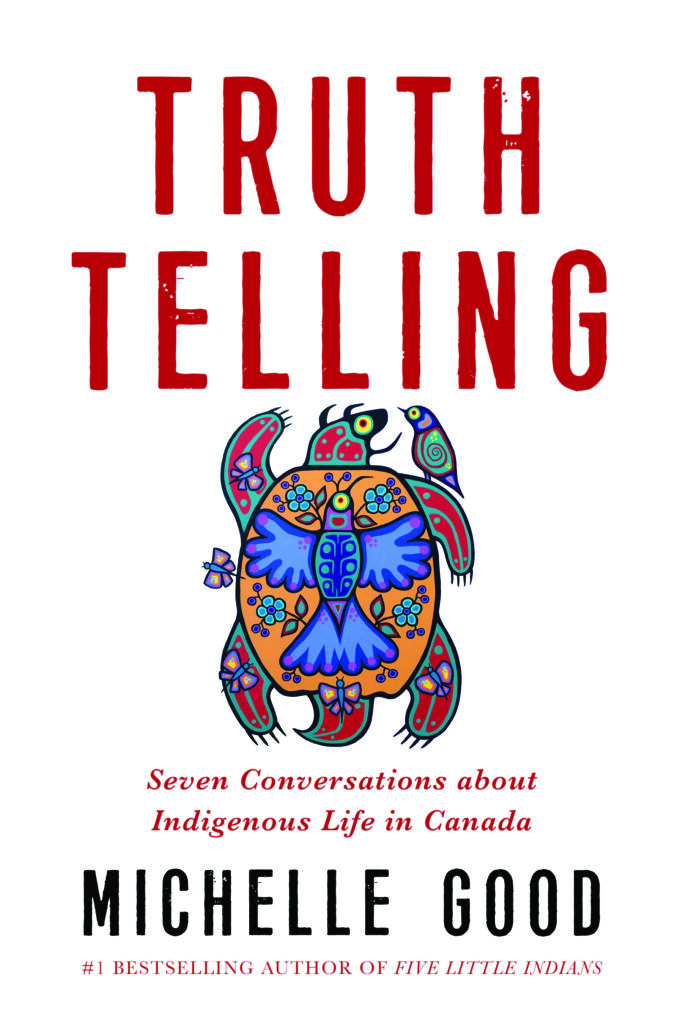
Michelle Good is a writer and a lawyer, both professions dedicated to the careful arrangement of words, truths that give meaning and dignity to human life. Now more than ever, as alternate truth becomes cruel reality, we need to rely on the vision of artists grounded in the rules of social justice. Good is just such a person and her book starts off with her premises clearly stated.
Injustice occurred when colonisation transformed traditional lands that provided to each according to their needs into a Promised Land for the entrepreneurs of capitalism.
She clearly lays out the revealed transgressions of so-called “settlement” as genocide, the deliberate murder of a way of life that impacted on human and animal species and the earth itself, death everywhere as profit trampled reason and justice, just as it had in the home countries of many Settlers who believed they left oppression behind.
The premises she explores in her essays are based on the inextricable weaving of truth and reconciliation. First the truth, then the consequences. The empirical evidence is unequivocal: land was taken, people were starved, animal species were destroyed, and generations of children were stolen so that their culture could be annihilated.
This is not argument. It is fact presented in unwavering conversations. The evidence is in.
“Lucy and the Football” examines a Charlie Brown analogue where the ball is never in fair play and Lucy’s Come to Jesus moments are all scripted in a Doctrine of Discovery that legitimizes the conversion of all goods and properties to the profit of church and state. Sleight of hand is the guiding principle and all truths are alternative, even on paper signed in apparent good faith.
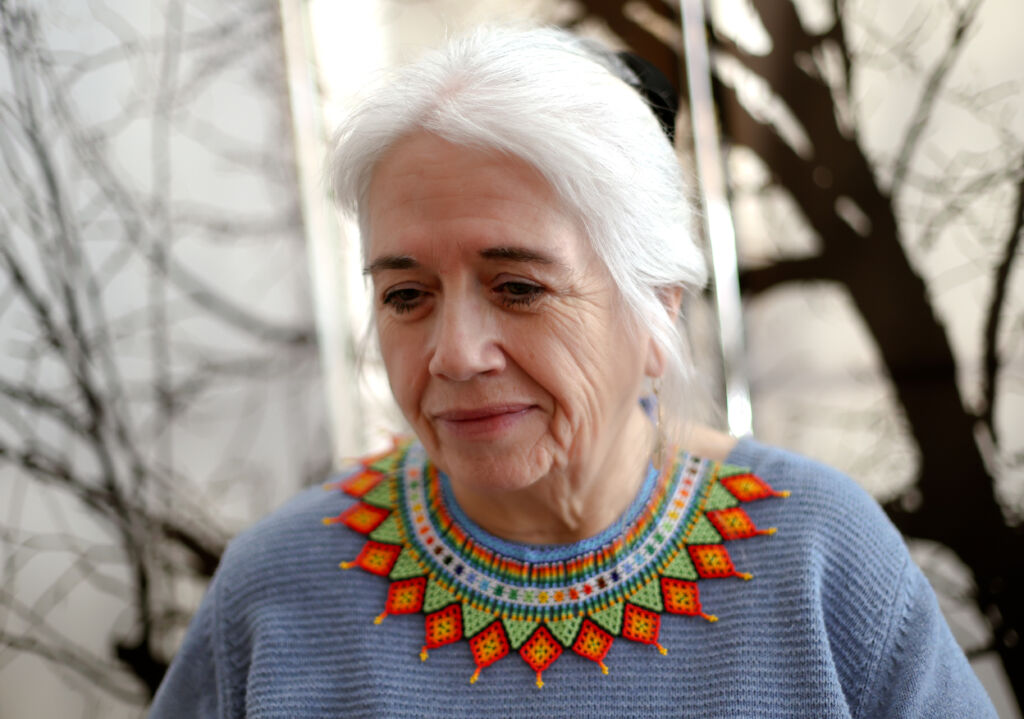
Promises made and broken are the signature of intent from the Indian Act, through the first Trudeau years until now. She writes, “We don’t just want Lucy to hold firm to that football instead of pulling it away. We want her to set aside the need to control the ball, and instead, with truth at our foundation and goodwill our mandate, we’d like her to stand with us as equal partners to build a road forward based on mutual acceptance of our respective nationhood.”
In that city on the shining hill, the lights are at last turning on as we begin to realise truth was never foundational and it is time to acknowledge what happened to astonishingly functional, may we say, matriarchal cultures when the colonists came to profit.
It will take a lot of survivor blankets to absolve our white-comer ancestors and the institutions that manifested evil intention to exploit, but the survivor quilt project and other acts of sincere goodwill, are a start.
In the conversation about bigotry “Racism, Carefully Sewn,” Good describes an oral history unlike any other, where Indigenous women, Target One, were deliberately sexualised, their “othering” a deliberate precursor to ultimate crimes, including kidnapping of children, wholesale murder of the disappeared and sterilisation, often during other medical procedures like childbirth, without permission. None of these things are rumours, as is often suggested. It happened in Canada and many were silent witnesses.
She describes the vilification of her own mother, a nurse and midwife, by her white mother-in-law, a cruelly intimate bigot, and we can all witness to this behaviour among a generation raised on their own version of oral storytelling rife with prejudice. Add the kidnapping of children by the system to starvation and poverty that led to disease and prostitution to the slave trading of Indian agents and it is a miracle that knowledge keepers, mainly women, survived to tell the stories essential to understanding history and tradition.
The church and government knew what they were doing when they silenced generations of culturally informed women and demonised female myths like Dzunuk’wa, the wild woman, much as the church had isolated and burned witches aka medicine women.
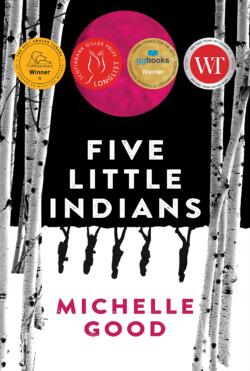
Destroying the credibility of women is the first step to undermining matriarchy, the shared governance of Indigenous people.
Taking their children is the criminal act she describes with intense personal agony in “$13.69” the chapter dealing with Scoop children and the pathetic compensation they were given, as if there were any compensation for lost childhood. She details sexual harassment, starvation, and humiliation as standard behaviour in the white middle-class families where stolen children were placed.
One family, the father a doctor, the mother a nurse, had a two-tier system. The tall genetically pure natural children ( does this sound familiar?) were fed differently, larger rations for bigger kids and the “Indians” were deprived lest they got fat and lazy like their birth family, which was continually denigrated.
During the Scoop compensation, I offered to witness for this brother and sister, but they demurred. No more humiliation. They would remember in silence as threatened. The little girl who balled her fists when her stepmother railed against her people is now a successful Indigenomic leader and the son, cowed and gentle, is dead. No explanation necessary. One fought back. The other died in a car accident. That is what happens when children are traumatised: extreme outcomes.
As a lawyer, Good knows this terrain well. As a scoop child, she feels it in her marrow. She writes from the bone, but with a lawyer’s concern for truth.
We can assume her Buffy Sainte-Marie mention will be footnoted or removed in the next edition. The point remains that these children have mountains to climb and are too often strangers to their families and themselves by the time they reach adulthood.
In “The Rise and Resistance of Indigenous Literature,” Good arrives at the seats of the mighty. Fiction is history filtered through the norms of experience, and at last the real stories are being told with power as resilience obliterates the false language of oppression.
We have waited long for this opportunity to hear this side of the conversation as poets and playwrights, fiction and non-fiction writers from Indigenous nations speak their truth. In this chapter, Good immortalises and memorializes ground breakers like Chief Dan George, Lee Maracle, and the gentle trickster Dan Moses, now gone to spirit, and a whole new generation of writers.
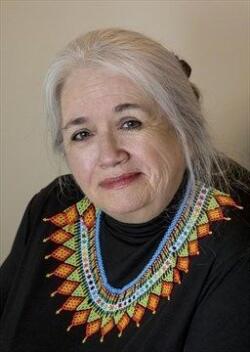
Now non-Indigenous writers, like the egregious Bill Kinsella, can no longer say they speak for the voiceless as the voiceless have been unmuzzled, their truth told in the first person.
In her penultimate chapter “Cultural Pillagers,” she deals with the new phenomenon, pretendians, typed in lower case because there is no nation for people who exploit the adversity and opportunity of others.
Staying within her literary context of fairy tale and imagination, the leaven in her narrative, she recalls the childhood game of Cowboy and Indian from the time when Cowboys always won at the Saturday matinees and in neighbourhood lanes and vacant yards. With new advantages and incentives, would be winners want to be Indians. This is some game and the rules are evolving. Is self-identification enough? Are all personal narratives real?
She is hard on the pretentians Boydon, Turpel-Lafond, where Sainte-Marie got a pass, maybe because the revelations about her story came out too late for the first edition of this book. Who is entitled to tell the anguished stories of the marginalised children of no culture who were disenfranchised by social prejudice and exclusion when Indigenous women lost their status for marrying out of culture?
“Playing Indian” is an ongoing social issue that will take time to resolve. Good’s own family, like many others, is impacted by the genetic variations that result from inter-cultural marriage. Although she doesn’t present full detail, this conflict impacted her own adolescence, a critical time in the mental well-being of all children, let alone those conflicted within the family.
The fact remains, she was scooped and then, later insult, inadequately compensated. Like one of the scoop children mentioned above, Good became stronger. It is to her and warriors like her that we look for the return to balance in her own and in world culture.
Because Indigenous community is attached to the land, her last analogue serves her arguments well, as she argues the case for native plants growing from the compost of their ancestors.
When we transplant, we disturb the organism and the soil it is placed in, not to mention the organisms that have always thrived in that environment. It is a matter of respecting the earth because that is our ultimate blanket, all quilts aside. It is up to us to read books like this one, to have rational discourse, and consider the integrity of our needlework, the respect we have for ourselves and others, especially Mother Earth.
In her final argument, “Land back” we arrive at the beginning. Why are we here, where only the land endures, and the answer is clear. We are custodians of our children and the planet and hopefully, the garden goes forward without us, with peace and harmony thriving in respect.
“The thread of colonialism must be removed from the fabric of Canadian society,” not through white papers that once again disequilibrate or the ambition of pretendians with personal agendas, but through restoration of land and dignity so that we can sing in the choir together, all sections remaining in place, reaching for the truest notes.
*
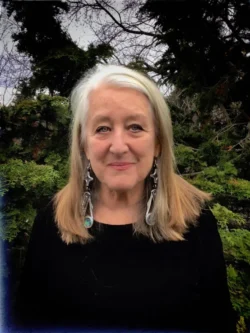
Reviewed by Canadian People’s Poet Linda Rogers, who is, at his request, compiling a memoir on the life of Kwagiulth Chief Tony Hunt, a controversial figure in post-colonial art and governance. [Editor’s Note: She has reviewed books by Marilyn Bowering, Taro Zion Joy, Heather Menzies, Brandi Bird, Leslie Gentile, David Bouchard & Kristy Cameron for The British Columbia Review.]
*
The British Columbia Review
Interim Editors, 2023-25: Trevor Marc Hughes (non-fiction), Brett Josef Grubisic (fiction and poetry)
Publisher: Richard Mackie
Formerly The Ormsby Review, The British Columbia Review is an online book review and journal service for BC writers and readers. The Advisory Board now consists of Jean Barman, Wade Davis, Robin Fisher, Barry Gough, Hugh Johnston, Kathy Mezei, Patricia Roy, Maria Tippett, and Graeme Wynn. Provincial Government Patron (since September 2018): Creative BC. Honorary Patron: Yosef Wosk. Scholarly Patron: SFU Graduate Liberal Studies. The British Columbia Review was founded in 2016 by Richard Mackie and Alan Twigg.
“Only connect.” – E.M. Forster
3 comments on “‘Real stories are being told’”
Thank you for sending me this book for review. It is time for all of us to assimilate all the truths. It is time for us to be a better nation of strong mutual respect.